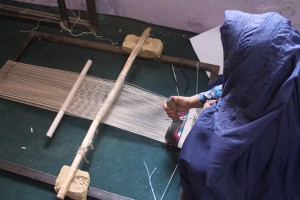From a child bride to a rights defender
News story
QUETTA, 28 September, 2017: It is a fine evening. A group of Afghan women are enjoying traditional Afghan tea with Roghni (Afghan snacks) and white Afghan sweets. Everybody is happy as they gather to fix the date for an engagement ceremony. Amid the excitement, the mother of the 14-year-old, soon-to-be-bride, takes everyone by surprise when she raises her concerns about underage marriages.
This woman is 45-year-old Adeela Bibi, an Afghan refugee, who resides in the north-western city of Quetta in Pakistan. Adeela informs the gathering that marrying off underage girls is an offence. “Forced marriages are against Islamic teachings and is considered a violation of the national and international laws,” she says.
Adeela herself was married when she was only 13 years old. She had no idea what marriage even meant. “As a young teenage girl, the responsibilities that came with marriage were alien,” she says.
“I was expected to grow from a child into a wife, woman and a house manager overnight. I had great difficulty performing the daily chores and was too naive to fully appreciate the scope of a relationship between married couples,” says Adeela Bibi.
Her [childish] conduct annoyed her in-laws. “I would often cry. My mother-in-law would beat me out of frustration because I could not perform the daily tasks up to the expectations,” she said.
Over the course of 32 years, Adeela Bibi has given birth to two daughters and six sons. Her husband is years older than her and is now too old to work.
In January 2017, Adeela was chosen to be part of the Safe from the Start project; a gender-based violence (GBV) prevention initiative that is implemented as a livelihoods project by UNHCR through its partner, Taraqee Foundation. Adeela learnt rug weaving, tailoring, and how to read and write.
Adeela attended awareness sessions on GBV and learned that religion, national and international laws empower women with many rights. She has been sharing her new knowledge with her daughters and women in her neighbourhood.
In addition to the knowledge and confidence that she has acquired, Adeela is making a living through rug weaving and tailoring. She expresses joy that she is able to buy food and other things for her children and for her husband.
She says that women must equip themselves with education and other skills to empower themselves to make meaningful contributions in their communities.
She says: “financial independence enabled me to participate in decision-making. I used to wear used cloths of others and now I buy new clothes for myself. It is a big deal to earn. This protects me from violence and exploitation.” She believes that this has enabled her to stand against harmful practices. She has also succeeded in stopping the marriage of her daughter at an early age.
Adeela Bibi says that she will not marry off her daughter until she is physically and mentally mature to handle the new life. Adeela’s younger daughter is studying at school, while the elder one is learning tailoring and embroidery skills at home.
Adeela believes that learning and working is the greatest achievement of her life and she is inspiring other women to work and to exercise their rights.
Humera Karem in Quetta






